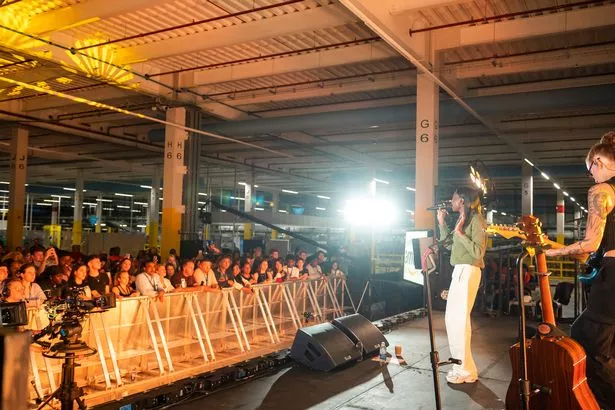Marketing secrets from the RockCorps CMO hall of fame:
- aling7
- Dec 6, 2023
- 7 min read
Updated: Feb 12, 2024
Stu Jackson of Amazon
Stu Jackson has had a rich career leading businesses and brands for more than two decades; He’s worked on both sides of the media fence – as a journalist and a comms expert.

From his early days at Orange in the Telco industry, to helping build and launch the EE brand, to his time at Nissan in the automotive sector through to his most recent role running International Corporate Communications for Amazon … his long and varied trip through the corporate realm has been both remarkable and interesting.
Yet, what distinguishes Stu is his unparalleled perspective on the peanut butter and chocolate of marketing and music—how the combination intricately threads through his strategies, captivating audiences. In this interview, we delve into Stu's journey, exploring his marketing philosophy, learning how he’s worked with RockCorps and Apprentice Nation at various points in his career.
What has social purpose meant throughout your career spanning telco, auto and now Amazon?
As a phrase, Social Purpose didn’t really exist until recently – the first time I was involved in something we could now call Social Purpose, and the notion of the responsible corporation coming into play, it was called CSR (Corporate Social Responsibility).
That was around 2006, and I was the Comms Director of Orange in the UK. CSR - as it was then - was one of the things I was really keen to help the company evolve in, not just because it was an opportunity to truly connect with customers, but because it was just the right thing – to do good as a company. Companies are there to make money and, in my opinion, that’s nothing to be ashamed of. However, I believe the way you do that, how you do it, and what your company does, is important and can have a very positive effect on other people and society.
For me, any social purpose probably came from my parents, both very wonderful people – my mum was a teacher and my dad a social worker. They fostered kids and did a lot of work with their wider local community – they were givers. So it felt weird to me in corporate life, if a company wouldn’t do that. That just felt wrong. The environment I’d grown up in was to be a part of your community and to give back - it rubs off on you.
Over the years, social purpose has evolved.
Brands like Benetton were among the first to take a position on social issues with really powerful and shocking campaigns in the 1980’s and 1990’s. Then, companies like Orange emerged and focused on the customer and democratizing communication. We offered access for everyone, made the internet free – these were huge social changes. We also had
strong partnerships in the arts that aimed to make a difference like The Orange Prize for Fiction – which gave female authors a platform - BAFTA – where we promoted young rising talent and independent filmmaking – and Glastonbury – where we supported addressing poverty and climate change through music.
2. When did you start working with RockCorps?
In the late 2000’s Orange started to work with RockCorps. The concept of Corporate Social Responsibility had become an industry, it became its own thing.
A lot of agencies started to pop up, trying to mirror similar things to what RockCorps was doing. There were of course pros and cons to this – it was good because there was a growing interest and a movement happening towards business-for-good, but also a lot of brands were being inauthentic and jumping on the social impact band wagon while not really living it in their values...whatever the Social Purpose equivalent of greenwashing is. (editor’s note: purpose washing)
There were many benefits to industry catching on to the fact that consumers didn’t just want companies to be making money from them or providing them a service. They wanted to engage with companies who had the same shared values. For us, at Orange, that’s where RockCorps came in.
3. They say music is the universal language. Is that just marketing b.s. – or rather, is it true for you and how have you used music to get your message across in and around an award-winning career?
Let me give you two perspectives, one from the business, the other from the personal side as a music-lover myself…
On the corporate side, I’m a firm believer that to build a fan base - those people who constantly return and use your service and love your brand. You need to tap into people’s passions and meet them where they are, rather than expect them to come to where you are as a company.
Look at the UK music industry - a significant global export. This global influence is something that deserves more recognition, that we should take pride in. I have the opportunity to travel a lot, and the UK music scene remains unique and incredible for its global reach.
Music is clearly a profound passion for many, making it a logical choice for brands that want to align with people’s passions. Whether it’s music, sports, or any other interest, finding an authentic connection that resonates with customers is essential.
On the personal side, as a musician and songwriter myself, I love creating music and have always used that passion as my creative outlet outside of work. In fact, every year instead of a card to friends and family, we write and record a Christmas song. We’ve done this since the kids were babies and the eldest is now 20! With the streaming services now, I get paid for publishing my music – for the Christmas songs, every time someone listens, we donate that money to charities. You can check out Stu’s latest release for Christmas here, this time in support of the Starlight Children’s Foundation.
4. When you first worked with RockCorps at Orange, what were you seeking? How did RockCorps help you with that?
When I became the Comms Director of Orange in 2008, I inherited Corporate Social Responsibility. We were looking for partners who could help in the arts but, also help us do something really interesting around Social Purpose. That’s when I first met Stephen and the idea of RockCorps appeared – “Give, Get Given“. It was so perfect, and I was pleased to see that’s still the phrase RockCorps uses today.
RockCorps was such an interesting idea that our brand marketing and PR teams got involved in. It was the first very direct Social Purpose thing that we did. Working with RockCorps, we were able to partner with an organization already doing something with Social Purpose at its very core. With Orange having a strong heritage in music and the arts, it was a natural fit and made total sense. Orange RockCorps grew significantly in the time we worked together – I was there another 6 years, and the partnership remained because at its core it felt authentic, relevant and was genuinely making a difference. Especially when you think about the work that RockCorps does in engaging people from more disadvantaged communities - it totally democratized access to both volunteering and the arts. You have to give something back to your community to get this golden ticket that money can’t buy was such a simple and brilliant idea. It was not about how much money you’ve got. Instead it created a total level playing field where it was just about how good a person you are – such a cool idea. Then, when you’re getting the biggest names in the industry, you realize that you’re onto something very, very special and it means a huge amount to everyone who gets involved.
5. And now RockCorps has created Apprentice Nation, how has it helped with your objectives?
I've been fortunate to work for brands that I was a customer of and loved before becoming an employee. Amazon is one of those brands. An amazing company as a customer and now working here. The company really demonstrated its social purpose during the pandemic, ensuring people got what they needed, and we continue to do that today. We create jobs, support apprenticeships, and make a significant economic contribution to the countries we operate in.
When you look at Amazon’s passion for apprenticeships, making sure young people have a chance to have a choice in their late education and early work journey – bringing in hundreds and hundreds of apprentices every year is a massive thing for us as a business across all sectors. There are so many different avenues for young people to benefit from.
Working with Apprentice Nation was an experiment for us. We already had something that’s exceedingly authentic – our Amazon apprenticeship scheme. That’s something we’ve done for ten years now in the UK. We’ve brought in thousands of people, giving them their first opportunity of work. We were thinking, is there a way we could celebrate that with the right kind of organization?
An organization that is also authentic in the space - not just sticking a logo on something, but doing something to raise awareness of the work we’ve done historically and also the opportunities we’re giving people, saying “you could be next”. Trying to get that message out was one of the reasons we worked with Apprentice Nation. Apprentice Nation already had a strong track record in connecting with the right kind of people, so that was really the purpose behind it.
“Together we put on a gig inside an operational Amazon Fulfilment Centre with Cat Burns, an artist who’s authentic, relevant and connects with young people. The delivery? Spotless”. (Linked In post)
6. For other CMOs in your position - what would your advice be?
i. Make sure that what you’re doing is authentic to your brand.
ii. Meet your customers where their passions lie rather than expect them come to you.
iii. Music has a power to unite, build emotional connections between brands and their fan base.
iv. If you want to build a long-standing, credible, authentic brand, ensuring your customers love you - not just like you - is key. That requires you to have certain values as a business and to live those values. Customers see those values and you can then meet them where their passions are. One of which is, without question, music.
















